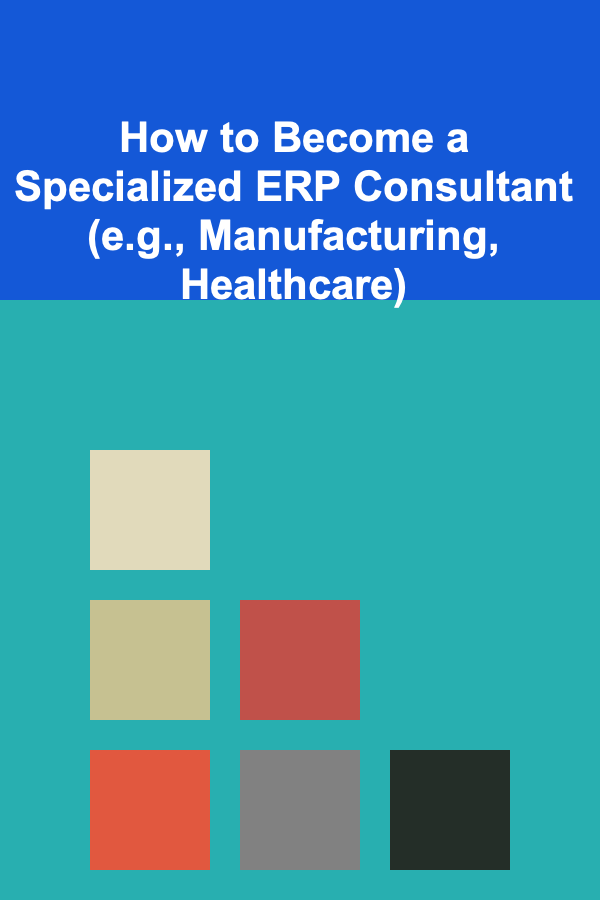
How to Become a Specialized ERP Consultant (e.g., Manufacturing, Healthcare)
ebook include PDF & Audio bundle (Micro Guide)
$12.99$10.99
Limited Time Offer! Order within the next:

In today's digital landscape, organizations rely heavily on Enterprise Resource Planning (ERP) systems to streamline operations, enhance productivity, and manage their resources more effectively. ERP consultants play a crucial role in ensuring that businesses select, implement, and optimize these complex systems. Becoming a specialized ERP consultant, whether in manufacturing, healthcare, or any other niche, requires a combination of technical knowledge, industry expertise, and interpersonal skills. In this article, we'll explore how to become a specialized ERP consultant, with a particular focus on manufacturing and healthcare sectors.
Understanding ERP Systems
What is an ERP System?
At its core, an ERP system is a software solution that integrates various functions within a company into a unified system. ERP systems manage everything from inventory and human resources to finance and customer relationships. The goal of ERP is to break down data silos, allowing for improved communication and more efficient operations across different departments.
For instance:
- Manufacturing ERP: It handles everything from production scheduling to inventory management, ensuring that raw materials are available, production is on schedule, and orders are fulfilled promptly.
- Healthcare ERP: These systems manage patient data, billing, appointment scheduling, and inventory management for medical supplies, among other functions.
As a consultant, you'll help organizations implement and optimize these systems, ensuring that the chosen ERP solution aligns with the company's unique needs and objectives.
Key ERP Software Providers
Before delving into the specialization of ERP systems, it's crucial to familiarize yourself with the major ERP vendors that dominate the market:
- SAP: Widely used across industries, SAP offers comprehensive ERP solutions, particularly popular in manufacturing, retail, and healthcare.
- Oracle: Known for its advanced ERP functionalities, Oracle ERP caters to large enterprises and provides robust financial and operational tools.
- Microsoft Dynamics: This ERP solution is highly customizable and caters to small and medium enterprises (SMEs), making it a popular choice in various industries.
- Infor: Specializes in ERP solutions tailored to specific industries, including manufacturing and healthcare.
- Epicor: Known for its deep focus on manufacturing industries, Epicor offers specialized solutions for production, distribution, and retail.
Familiarizing yourself with the various ERP platforms is essential, as each system will have its own nuances, capabilities, and industry-specific features.
Developing Technical Skills
Core Skills for ERP Consultants
To become an ERP consultant, especially in specialized fields like manufacturing or healthcare, you'll need to develop a diverse skill set. Here are some of the core technical skills that will be beneficial:
1. System Configuration and Customization
ERP systems are often highly customizable to meet the unique needs of an organization. As a consultant, you'll need to know how to configure the system to ensure that it supports the organization's operations effectively. For instance, in manufacturing, you might configure workflows for production scheduling, while in healthcare, you could customize modules for patient record management and scheduling.
2. Database Management
Since ERP systems handle vast amounts of data, it's crucial to understand how to manage databases. Knowledge of relational databases such as SQL, as well as familiarity with data migration processes, will be essential as you will often be involved in data transfers from legacy systems to the new ERP platform.
3. Integration Expertise
ERP systems often need to integrate with other enterprise tools, such as Customer Relationship Management (CRM) systems, third-party logistics (3PL) services, or accounting software. Your ability to integrate ERP with other platforms is vital to ensuring the business operates smoothly.
4. Technical Support and Troubleshooting
No matter how well an ERP system is set up, there will be times when issues arise. As a consultant, you must be able to provide ongoing technical support, troubleshoot issues, and suggest system improvements as necessary.
5. Data Analytics
Understanding the power of analytics within an ERP system is key to helping businesses use their data for informed decision-making. Your ability to generate reports, analyze trends, and use business intelligence tools will be highly valued, especially in industries like manufacturing, where production efficiency is paramount.
Learning ERP System Development
While you don't necessarily need to become an expert in ERP software development, understanding the development framework behind ERP systems will help you make better decisions during implementation and customization. Learning languages such as Java, ABAP (for SAP), and SQL will be beneficial. For healthcare ERP, you might also need knowledge of standards such as HL7 (Health Level Seven), which ensures data interoperability between systems in the healthcare industry.
Gaining Industry Knowledge
Specializing in Manufacturing ERP
In manufacturing, ERP systems help organizations manage their supply chain, optimize production processes, and ensure product quality. To become a specialized ERP consultant in this field, you need a deep understanding of manufacturing processes and challenges. This includes:
1. Supply Chain Management
Manufacturing companies rely on robust supply chains to ensure that raw materials are sourced, inventory is managed, and products are delivered on time. ERP systems help streamline these processes. Knowledge of concepts such as Just-in-Time (JIT) inventory, lean manufacturing, and demand forecasting will be key in understanding how ERP systems should be implemented.
2. Production Scheduling
ERP consultants in manufacturing need to understand the complexities of production scheduling. The ability to optimize production timelines, track inventory levels, and ensure that machinery is used efficiently are vital skills in this area.
3. Regulatory Compliance
Manufacturing industries are subject to numerous regulations, including quality standards and environmental policies. ERP consultants should understand how to configure systems to ensure compliance with regulations like ISO, OSHA, and others.
4. Industry-Specific Modules
Manufacturing companies often have very specific needs that require customized ERP modules. For instance, ERP systems for discrete manufacturing will differ significantly from those designed for process manufacturing. Understanding the differences and how ERP can be adapted to fit these models is critical.
Specializing in Healthcare ERP
The healthcare industry faces unique challenges, including managing patient data, ensuring HIPAA (Health Insurance Portability and Accountability Act) compliance, and optimizing medical workflows. A healthcare ERP consultant should have expertise in the following areas:
1. Patient Data Management
Healthcare ERP systems must efficiently manage patient data while ensuring compliance with stringent privacy laws. Familiarity with HIPAA regulations and best practices in medical data security is essential.
2. Appointment Scheduling
In healthcare, appointment scheduling and patient flow management are crucial for efficiency. An ERP consultant must configure systems to manage patient appointments, track physician availability, and optimize scheduling.
3. Billing and Insurance
Healthcare organizations deal with complex billing procedures, especially when insurance claims are involved. You'll need to understand insurance codes, patient billing cycles, and how to configure ERP systems to handle medical billing effectively.
4. Medical Inventory Management
Hospitals and clinics must track vast inventories of medical supplies and equipment. ERP systems need to be configured to manage both high-cost and low-cost items, track expiration dates, and ensure that supplies are always available.
5. Regulatory Compliance
In healthcare, ERP systems must adhere to various regulations, such as HIPAA for data security and FDA guidelines for medical devices. Your ability to configure systems to ensure compliance will be essential for success in this field.
Obtaining Certifications and Training
ERP Vendor Certifications
Many ERP vendors offer certification programs that validate your expertise in their specific systems. For instance:
- SAP Certified Application Associate: A certification for professionals working with SAP ERP systems, particularly relevant in manufacturing.
- Oracle ERP Cloud Certification: A certification for consultants specializing in Oracle's ERP solutions.
- Microsoft Certified: Dynamics 365 for Finance and Operations: This certification is designed for professionals specializing in Microsoft Dynamics ERP solutions, commonly used by SMEs across various industries.
Industry-Specific Certifications
Apart from ERP vendor certifications, consider pursuing certifications relevant to the specific industries you wish to specialize in. For example:
- Certified Manufacturing Professional (CMP): This certification provides deeper knowledge of manufacturing processes and best practices.
- Certified Healthcare CIO (CHCIO): A certification for healthcare IT professionals, focusing on managing technology in healthcare environments.
Building Practical Experience
Gaining Hands-On Experience
While certifications provide a solid foundation, hands-on experience is essential for becoming a proficient ERP consultant. Look for opportunities to:
- Intern or Work for an ERP Implementation Firm: Gain experience by working for a firm that specializes in ERP implementation. This will give you exposure to different industries and ERP systems.
- Volunteer or Freelance: If you're transitioning into ERP consulting from another field, offering your services on a freelance basis can help you build experience.
- Work with ERP Implementations: Whether it's assisting with system installations, data migration, or user training, any practical experience with ERP systems will be invaluable.
Developing Soft Skills
Apart from technical knowledge, ERP consultants must excel in soft skills, such as:
- Communication: You'll need to communicate effectively with stakeholders, including business executives, technical teams, and end-users, to understand requirements and explain solutions.
- Project Management: ERP implementations are large, complex projects. You'll need strong project management skills to ensure deadlines are met, and the project stays on budget.
- Problem-Solving: ERP consultants often face unexpected challenges during implementation. Your ability to think on your feet and come up with creative solutions will set you apart from others.
Conclusion
Becoming a specialized ERP consultant in fields such as manufacturing or healthcare requires a blend of technical knowledge, industry expertise, and excellent soft skills. Whether you choose to work with large corporations, small businesses, or healthcare providers, your role as an ERP consultant is pivotal in optimizing business processes and ensuring that organizations get the most value from their ERP systems. By gaining the right certifications, experience, and industry-specific knowledge, you can establish yourself as a sought-after ERP consultant and enjoy a rewarding career helping businesses streamline their operations.
Reading More From Our Other Websites
- [Needle Felting Tip 101] Step-by-Step Guide: Needle Felting Your First Whimsical Cat Sculpture
- [Home Maintenance 101] How to Keep Your Home's Windows Sealed and Energy-Efficient
- [Beachcombing Tip 101] Best Beachcombing Ethics & Conservation: Responsible Practices for Protecting Coastal Environments & Wildlife
- [Trail Running Tip 101] From Solo to Squad: How Joining a Trail Running Group Improves Performance
- [Home Lighting 101] How to Design Your Dream Lighting Plan for a New Home
- [Ziplining Tip 101] How to Pack the Perfect Gear Kit for Multi‑Day Zipline Backpacking Trips
- [Home Space Saving 101] How to Store Seasonal Items in Small Spaces
- [Tiny Home Living Tip 101] Best Insulation Techniques to Keep Your Tiny Home Cozy Year‑Round
- [Biking 101] The Ultimate Guide to Bike Festivals: Best Events for Cyclists
- [Home Party Planning 101] How to Plan a Holiday Party That's Perfect for Family and Friends

How to Declutter and Organize Your Digital Life
Read More
How to Identify and Overcome Procrastination Triggers
Read More
How to Socialize Your Pet with Other Animals and People
Read More
Mastering Operations Research: Strategies for Effective Decision Making
Read More
How to File an Auto Insurance Claim After a Minor Accident
Read More
How to Design a Network for a Remote Workforce
Read MoreOther Products

How to Declutter and Organize Your Digital Life
Read More
How to Identify and Overcome Procrastination Triggers
Read More
How to Socialize Your Pet with Other Animals and People
Read More
Mastering Operations Research: Strategies for Effective Decision Making
Read More
How to File an Auto Insurance Claim After a Minor Accident
Read More